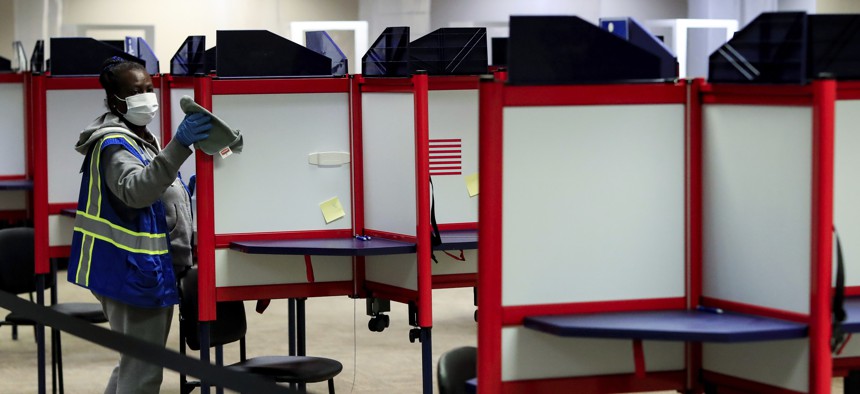Supply Chain Issues, Poll Worker Shortages Worry States Ahead of Elections

A poll worker cleans after a voter cast their ballot at the Hamilton County Board of Elections on Election Day, Tuesday, Nov. 3, 2020, in Norwood, Ohio. AP Photo/Aaron Doster
Election officials in some states are recruiting more poll workers but say getting power supplies and extension cords are also problems.
Poll worker shortages and supply chain issues are among the problems state and local elections officials are contending with as they prepare for the upcoming Nov. 2 elections.
Ohio recruited and trained a record number of poll workers ahead of last year’s presidential election, despite concern that the coronavirus pandemic had made it harder to find people for the job. But recruiting enough people to staff voting sites across the state has proven more difficult this year. Ohio is short about 17,000 workers from its 42,000-person goal, according to Secretary of State Frank LaRose.
“As this year’s important November election approaches, we’re still a long way away from ensuring a full complement of poll workers to staff our thousands of polling locations across the state,” LaRose said in a public service announcement released this month to drum up support. “If you volunteered to serve as a poll worker last year or have ever wondered what it’s like to serve your community and perform an important patriotic duty in a time of need, Ohio voters need you.”
Ohio took several steps last year to increase recruitment, including implementation of a rule change that allows attorneys to earn continuing education credits by working the polls. The state also created an online poll tracker that shows the number of vacancies in each county that need to be staffed.
Poll worker recruitment has also been a challenge in states, including New Jersey. To help, Gov. Phil Murphy signed an executive order boosting poll worker pay from $200 to $300 on Election Day. Lawmakers approved $400-a-day payments for poll workers to staff the primary election earlier this year.
The boost in pay has helped attract workers, said Nicole DiRado, administrator of the Union County Board of Elections.
“We were down about 1,000 poll workers. It was looking pretty bleak,” DiRado said.
Since the increased pay was approved, DiRado said the county elections board has fielded more interest and is now short only about 100 poll workers.
Many states expanded early voting or absentee ballot access last year to reduce crowding at polling places during the deadly pandemic. Some states that reported difficulty recruiting enough poll workers last year were unable to open all of their regular polling places. Others relied on mega sites that incurred long lines.
‘Stuff You Wouldn’t Think About’
While Union County is closer to meeting its staffing goal and has the poll workers needed to cover early voting sites that are open, the supply chain issues that surfaced because of the global pandemic have been another cause for concern, DiRado said.
New Jersey has switched to all new electronic poll books this election and has early, in-person voting for the first time.
“If I need to make sure 862 electronic poll books work on Election Day, I need to make sure I have extension cords that can be here in time to pack supply bags,” DiRado said.
But getting power supplies, extension cords and other supplies for the election board’s warehouse has been challenging, she said.
“It’s stuff you wouldn’t think about but they are real problems,” she said.
Andrea Noble is a staff correspondent with Route Fifty.
NEXT STORY: Cities Crack Down on Unvaccinated Municipal Workers





